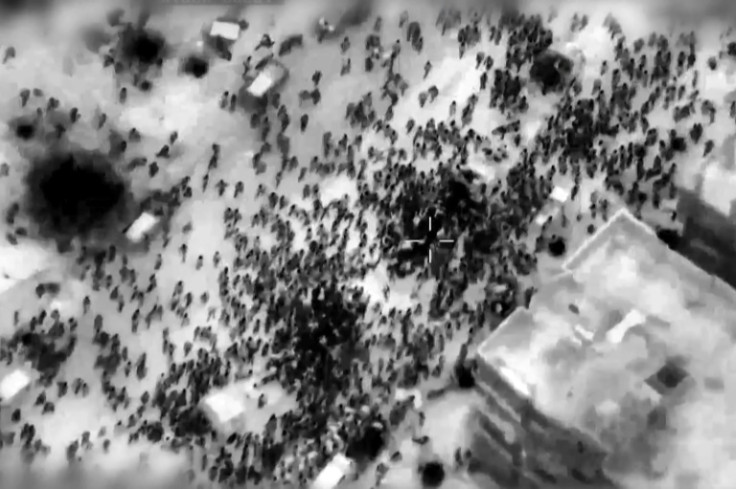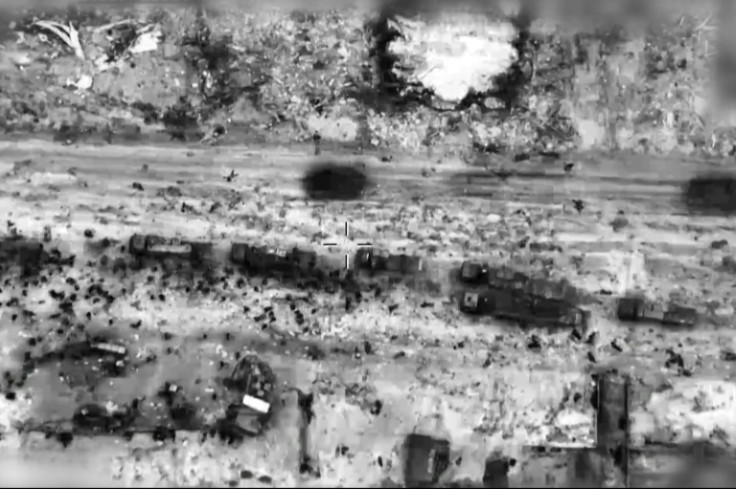
The crowd flocked to the aid distribution point early Thursday, desperate for food amid Gaza's looming famine, only to be met with lethal chaos including live fire by Israeli troops.
By mid-afternoon more than 100 people were reported dead in the grisly incident which underscored worsening shortages in the besieged Palestinian territory.
All told, Thursday's "massacre" at Gaza City's Nabulsi roundabout killed 104 people and wounded 760, said Ashraf al-Qudra, spokesman for Hamas-run Gaza's health ministry.
Just hours, earlier the Palestinian death toll from the nearly five-month-old war in Gaza had topped 30,000.
But there were conflicting reports on what exactly was responsible for Thursday's deaths.
Qudra blamed Israeli troops, and Israeli sources confirmed to AFP that the Israeli forces at the scene did open fire, having perceived the crowds near the trucks as a "threat".
A spokesman for Israeli Prime Minister Benjamin Netanyahu's office, however, said many of the dead were crushed by the trucks themselves.
"Aid trucks were overwhelmed by people trying to loot and drivers ploughed into the crowd of people, ultimately killing tens of people," said the spokesman, Avi Hyman.
A young Palestinian man who was among the wounded spoke of chaotic scenes.
"There were crowds of people, but the occupation (forces) kept firing towards us," the man told AFP while lying on the dirty, crowded floor at Kamal Adwan Hospital waiting for treatment
Outside, four women in headscarves wailed while clutching at the lifeless body of a bearded man wrapped in white cloth, while men lined up to pray nearby.
At Al-Shifa Hospital in Gaza City, doctors were "unable to deal" with the flood of casualties "as a result of weak medical and human capacities," Qudra said.
Hamas, whose unprecedented October 7 attack on southern Israel kicked off the war, denounced what it described as a "hideous and heinous" massacre.
The Hamas attack resulted in the deaths of around 1,160 people, mostly civilians, according to an AFP tally of official Israeli figures.
Israel's withering military response has now killed at least 30,035 people, mostly women and children, according to the health ministry, which does not specify how many fighters are included in the toll.
The offensive has caused widespread devastation in Gaza and severe shortages of food, water and medicine.
For months, aid workers have warned of an increasingly desperate situation for Gazan civilians, and on Monday an official from the UN humanitarian office OCHA said widespread starvation was "almost inevitable".
UN estimates show that 2.2 million people -- the vast majority of Gaza's population -- are threatened with famine, particularly in the north where destruction, fighting and looting make the delivery of food almost impossible.
According to the UN agency for Palestinian refugees, UNRWA, just over 2,300 aid trucks have entered the Gaza Strip in February, down by around 50 percent compared to January.
That is an average of well below 100 trucks per day, down from around 500 that were entering daily before the war.
It was precisely that scarcity that drove crowds to rush the trucks at Nabulsi roundabout on Thursday, a witness told AFP.
Aerial footage distributed by the Israeli military showed large groups approaching a line of moving trucks on foot.
"Trucks full of aid came too close to some army tanks that were in the area and the crowd, thousands of people, just stormed the trucks," the witness said, declining to be named for safety reasons.
"The soldiers fired at the crowd as people came too close to the tanks."
Thursday's incident in Gaza City spurred a heated exchange at the Human Rights Council in Geneva, where Palestinian ambassador Ibrahim Mohammad Khraishi confronted his Israeli counterpart about the reported casualties.
"Are these human shields? Are these Hamas combatants?" Khraishi asked.
Israel says it wants to eliminate Hamas, but diplomats are scrambling to broker a truce before the Muslim holy month of Ramadan, which is set to begin on March 10 or March 11, depending on the lunar calendar.
At Kamal Adwan hospital, a Palestinian woman checking on relatives caught up in the chaos at Nabulsi roundabout said the world should "take pity" on Gazans.
"My nephews went there to bring flour, but they (Israeli forces) fired on them," said the woman, who did not give her name.
"We are under siege. Take pity on us. Ramadan is coming soon. People should look at us. Pity us."








